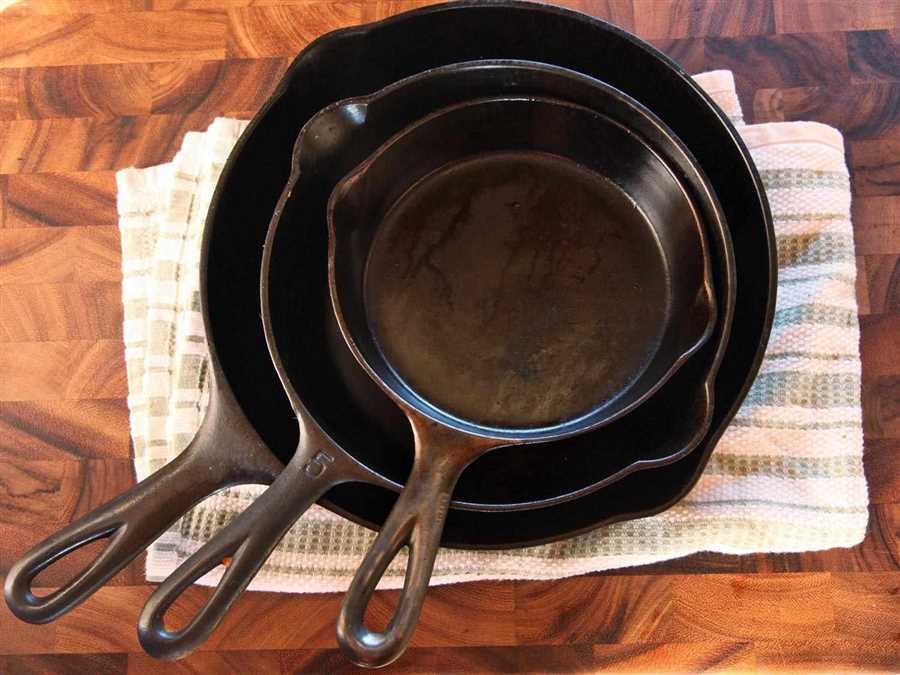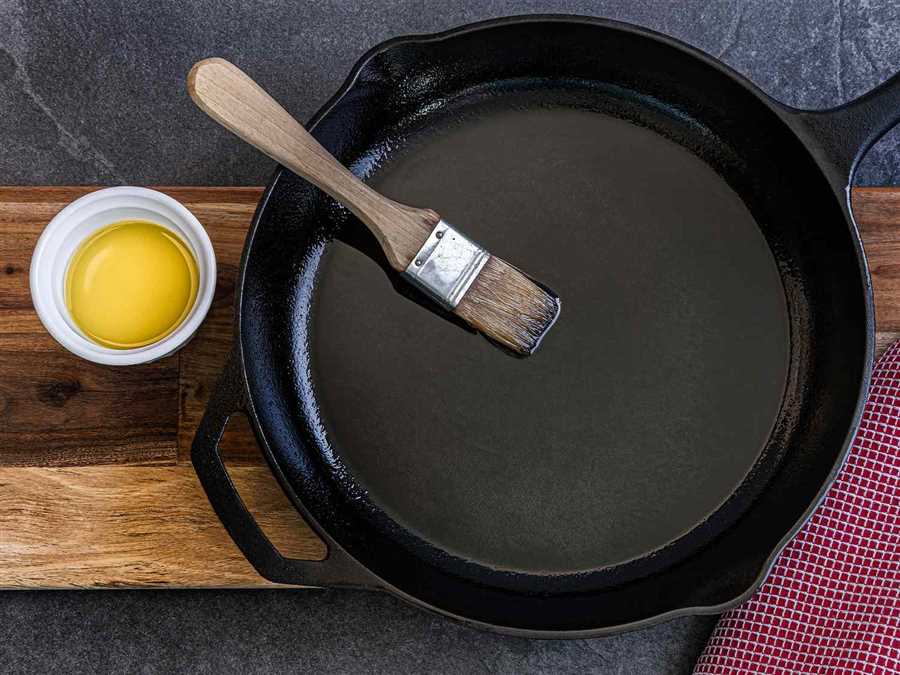Cast iron cookware has been used for centuries due to its durability and ability to evenly distribute heat. But did you know that using cast iron cookware can also increase your iron intake?
Iron is an essential mineral that plays a crucial role in our overall health. It is responsible for transporting oxygen throughout our bodies and maintaining healthy red blood cells. While you can get iron from various sources like meat, beans, and leafy greens, cooking in cast iron can be an additional way to boost your iron levels.
When you cook food in a cast iron pan, a small amount of iron leaches into the food. This happens more when you are cooking foods that are high in acid or moisture, such as tomatoes or sauces. The longer you cook, the more iron is transferred. So, the next time you make a hearty tomato sauce or simmer your favorite stew in a cast iron pot, you are not only adding flavor but also increasing your iron intake.
It’s important to note that the amount of iron leached depends on the type of food, cooking time, and the condition of your cast iron cookware. Generally, cooking acidic foods for longer periods and using older, well-seasoned cast iron pans will result in more iron being transferred.
If you are looking to boost your iron levels, cooking in cast iron can be a simple and effective way to do so. However, it’s always a good idea to consult with a healthcare professional or nutritionist to determine your specific iron needs and ensure that you are getting enough of this vital mineral.
Cooking in Cast Iron:
Cast iron cookware has been used for centuries for its durability and heat retention properties. It is known for its ability to distribute heat evenly, making it a favorite among professional chefs and cooking enthusiasts.
Not only does cooking in cast iron provide excellent heat distribution, but it can also be a source of dietary iron. When cooking acidic or high moisture foods in cast iron, small amounts of iron can be transferred to the food. This can be especially beneficial for individuals who are at risk of or have iron deficiency.
However, it is important to note that the amount of iron transferred to the food is relatively small and may not be significant enough to meet daily iron requirements. The iron content will also depend on the acidity of the food being cooked and the length of time it is cooked in the cast iron pan.
It is recommended to season your cast iron cookware before using it to enhance its non-stick properties and prevent rust. Seasoning involves coating the surface of the cookware with a layer of oil and heating it to create a protective layer. This process will not only improve the cooking performance of the cast iron but also help in the maintenance of the cookware.
In conclusion, cooking in cast iron can provide excellent heat distribution and may contribute small amounts of iron to your diet. While it may not be a significant source of iron, it is still a beneficial addition to your cooking routine.
Absorbing Iron:
When cooking in cast iron, a small amount of iron can actually be absorbed into the food. This happens due to the porous nature of cast iron cookware.
Iron is an essential mineral for the human body, and incorporating it into your diet is important for overall health. Using cast iron cookware can be a simple and effective way to add iron to your meals.
How does it work?
When food is cooked in cast iron, especially foods high in acidity or moisture such as tomatoes or sauces, a small amount of iron is released from the cookware and absorbed into the food. The longer the food is cooked and the higher the temperature, the more iron will be absorbed.
It’s important to note that the amount of iron absorbed will be minimal and will depend on factors such as the acidity of the ingredients and the length of cooking time. However, every little bit counts, especially for individuals who may have iron deficiency or are at risk of iron deficiency anemia.
Benefits of absorbing iron:
Getting iron from cooking in cast iron can provide a range of benefits, including:
- Improved iron levels: Consuming food cooked in cast iron can help increase your iron levels and prevent iron deficiency.
- Better energy levels: Iron is essential for the production of red blood cells, which carry oxygen throughout the body. Sufficient iron intake can improve energy levels and reduce fatigue.
- Enhanced brain function: Iron plays a crucial role in brain development and function. Adequate iron levels can support cognitive function and overall brain health.
- Boosted immune system: Iron is involved in the production of white blood cells, which are important for immune function. Getting iron from your cooking can help strengthen your immune system.
Overall, cooking in cast iron can be a simple and effective way to incorporate iron into your diet. However, it’s important to also consume other sources of iron, such as lean meats, leafy greens, and fortified cereals, to ensure you’re meeting your daily iron needs.
Myths and Misconceptions:
There are several myths and misconceptions surrounding cooking in cast iron and its relation to iron intake. Let’s debunk some of the most common ones:
1. Cooking in a cast iron skillet significantly increases your iron intake:

While it is true that cooking in a cast iron skillet can increase the iron content of your food, the actual amount is often exaggerated. The iron transfer depends on various factors such as the acidity of the food, the cooking time, and the condition of the cast iron surface. In reality, the increase in iron intake from cooking in cast iron is usually minimal and not a major source of dietary iron.
2. All cast iron cookware leaches harmful amounts of iron into the food:
This is another common misconception. While cast iron can release small amounts of iron into the food, it is not harmful unless you have a medical condition that requires strict control of your iron intake. In fact, some people may benefit from the slight increase in iron intake, especially those with iron deficiency or anemia.
3. Cooking acidic foods in cast iron is dangerous:
It is true that cooking acidic foods in cast iron can lead to small amounts of iron leaching into the food. However, this is generally safe and not a cause for concern. In fact, cooking acidic foods in cast iron can help create a natural non-stick layer called “seasoning,” which improves the cooking performance of the skillet.
Overall, while cooking in cast iron can contribute to your iron intake, it is not a significant source of dietary iron and is generally safe for most people. It’s important to maintain a balanced diet and consult with a healthcare professional for any specific dietary concerns or conditions.
The Science Behind It:

Iron is an essential mineral that the body needs to carry out several important functions, including the production of red blood cells and the transport of oxygen. While iron can be obtained from dietary sources such as meat, fish, and beans, cooking in cast iron can also contribute to iron intake.
When food is cooked in cast iron, a small amount of iron from the pan leaches into the food. This occurs due to a process called iron fortification, which involves the transfer of iron ions from the pan to the food. This process is enhanced when foods with high acidity or moisture are cooked in the cast iron pan.
The amount of iron that leaches into the food depends on various factors, including the type of food being cooked, the duration of cooking, and the condition of the cast iron pan. Research has shown that cooking in cast iron can increase the iron content of foods, particularly those that are acidic or high in moisture.
However, it is important to note that the amount of iron that leaches into the food from cooking in cast iron is relatively small. To meet the daily requirements of iron, it is still recommended to consume a varied diet that includes other iron-rich foods.
Benefits of Cooking in Cast Iron:
- Increased iron intake: Cooking in cast iron can help supplement iron intake, especially for individuals who have a higher risk of iron deficiency, such as pregnant women and individuals with certain medical conditions.
- Natural non-stick surface: Cast iron pans have a naturally non-stick surface, which means that less oil or fat is needed for cooking. This can be beneficial for those looking to reduce their fat intake.
- Even heat distribution: Cast iron pans have excellent heat retention and distribution properties, which allows for even cooking and prevents hot spots.
- Durability: Cast iron pans are known for their durability and longevity. With proper care, they can last for generations.
In conclusion, cooking in cast iron can contribute to iron intake due to the small amount of iron that leaches into the food during the cooking process. While the iron content may not be significant enough to solely rely on, it can be a beneficial addition to a varied and balanced diet.
Cooking Techniques:
When cooking with cast iron, there are several techniques that can help enhance the iron content in your food:
- Seasoning: Before cooking with cast iron, it’s important to season the pan. This process creates a natural non-stick surface and helps prevent rusting. To season a cast iron pan, coat it with a thin layer of oil and heat it in the oven.
- Preheating: Preheating your cast iron pan before cooking can help distribute heat evenly and ensure that your food cooks thoroughly. This is especially important when searing or frying.
- Low to medium heat: Cast iron retains and distributes heat very well, so it’s best to cook with low to medium heat. This will prevent your food from burning and ensure even cooking.
- Avoid cooking acidic foods for long periods: While cast iron is great for cooking acidic foods like tomatoes and citrus, leaving them in the pan for extended periods of time can break down the seasoning and release iron into your food.
- Stirring: When cooking with cast iron, it’s important to stir frequently to prevent food from sticking to the bottom of the pan.
- Cleaning: After cooking, avoid using harsh detergents or scrub brushes on your cast iron pan. Instead, use a gentle scrub brush or sponge and hot water to remove any food residue. Then, dry the pan thoroughly to prevent rusting.
By following these cooking techniques, you can maximize the amount of iron that is transferred from your cast iron pan to your food.
Questions and answers
Can you get iron from cooking in cast iron?
Yes, cooking in cast iron can increase the iron content in your food.
Is it true that cooking in cast iron can increase iron levels in your body?
Yes, cooking in cast iron can help increase iron levels in your body.
How does cooking in cast iron increase iron levels?
Cooking in cast iron can transfer small amounts of iron to the food, which can then be absorbed by the body.
What are the benefits of cooking in cast iron?
One of the benefits of cooking in cast iron is that it can increase the iron content in your food, which is beneficial for those with iron-deficiency anemia.






